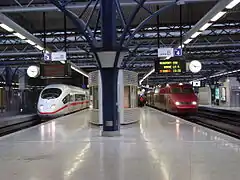Second Railway Package
The Second Railway Package is a group of European Union legislation which promote common standards and open access, working towards an integrated European railway area.[1]

History
For much of the 20th century, rail transport in Europe was dominated by national monopolies; these effectively excluded competitors from their networks. Starting in 1991, the EU developed legislation to open railways up to competition, which would help them regain modal share from road and air transport.[2]
Legislation
Directive 2004/49/EC
2004/49/EC is the Railway Safety Directive; it has since been amended by Directive 2008/110/EC. It harmonised safety principles, including procedures for granting safety approval to railway operators and infrastructure owners.[3] [4]
Directive 2004/50/EC
Directive 2004/50/EC harmonised interoperability requirements, particularly for high-speed rail. It amended Directives 96/48 and 2001/16; it has since been updated by 2008/57/EC.[3][5]
See also
- EU Directive 91/440: The First Railway Package
- ERTMS - A pan-European signalling system being promoted by the EU.
- European Railway Agency
- Rail transport in Europe
- Third railway package
- Fourth railway package
References
- "Transport: Second railway package of 2004 - European commission". 28 July 2010. Retrieved 7 October 2010.
- "Railway Mergers and Railway Alliances: Competition Issues" (PDF). 23 September 2008. Retrieved 7 October 2010.
- "European Union legislation". ORR. 6 October 2010. Retrieved 7 October 2010.
- "Licensing of railway undertakings". 28 May 2010. Retrieved 7 October 2010.
- "DIRECTIVE 2004/50/EC OF THE EUROPEAN PARLIAMENT AND OF THE COUNCIL". Retrieved 7 October 2010.
- "DIRECTIVE 2004/51/EC OF THE EUROPEAN PARLIAMENT AND OF THE COUNCIL". Retrieved 7 October 2010.
- "REGULATION (EC) No 881/2004 OF THE EUROPEAN PARLIAMENT AND OF THE COUNCIL of 29 April 2004 establishing a European railway agency". Retrieved 7 October 2010.